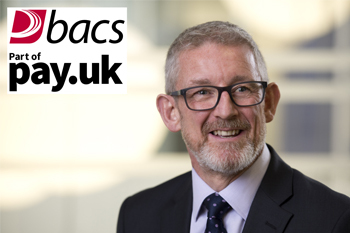We're all familiar with the Bacs name: it's been on our wage slips and our bank statements for years – 53 of them, to be precise. And, of course, with Bacs comes Direct Debit, the popular payment method that's been settling regular bills for companies and their customers for the last five decades, quietly running in the background as it processes more than 4.5 billion payments a year.
But that's just the number of payments in a single year. In the summer of 2021, Bacs Direct Credit and Direct Debit payments hit a lifetime total of 150 billion transactions, a number so big most of us can't even imagine it. To give that some perspective, the number of people who've ever walked the earth is estimated at 108 billion. That's a lot of people in the last 50,000 years – and even more payments in the last 50.
Now it's time to become just as familiar with another name: Pay.UK. And that's important because one of the main interfaces between you and Bacs is about to change.
While the way you interact with Bacs Direct Credit and Direct Debit will remain the same and the service will be as good, if not better, than it always has been, some things will begin to look different. Next year, the website you access to download reports and make administrative changes will move to Pay.UK branding and colours; that will be the most obvious initial change, and is the beginning of the process of bringing everything under one umbrella to reflect Pay.UK's role in operating these very familiar services.

After all, we've been responsible for those services for more than three years alongside Faster Payments and cheques; practically speaking, all of those payments came together as part of our company some time ago – now it's time to reflect that visually, too, under the Pay.UK brand. This is a natural next step and represents a continuation of the evolution of Bacs – it hasn't always looked like it does today, or even provided the same service.
Back in 1968, the focus was solely on a new way to move money between banks. In fact, that's what Bacs was originally called: the Inter Bank Computer Bureau. A few years later, it became the Bankers' Automated Clearing Services – something some people still mistakenly believe stands. The adoption of Bacs, as name rather than acronym, originally came about to acknowledge the first building society offering Bacs services in the 80s.
Today's Bacs services have come a long way since the very first payments were processed. For example, magnetic tapes used to transfer funds became the internet-based Bacstel-IP, and the Automated Direct Debit Instruction Service (AUDDIS) was introduced to take much of the paper out of the communications between billers and banks and pave the way for Paperless Direct Debit.
As that evolution was taking place, demand for the core services continued to grow. In the early years of automated payments, there were just a few thousand transactions being processed (and those by a roomful of computers that had less processing power than your mobile phone). Since then, paying this way has become an integral part of both billing and customer lives to the point where almost everyone in the UK is touched by Direct Debit, Bacs Direct Credit or, in many cases, both.
Fifty years ago, regular household commitments were limited to energy, rent, mortgages. In 2021, we have mobile phone bills, broadband bundles, gaming subscriptions, half a dozen different types of insurance, plus many more. For both heritage and relatively new sectors, collecting by Direct Debit is a time and cost-effective option for billers as well as providing payers with the security they expect both in knowing that the bill will be paid and also because of the protection provided by the Direct Debit Guarantee.
When you put Direct Debit's broad footprint together with the proportion of the UK workforce being regularly paid by Bacs Direct Credit – a conservative estimate is 90% – and add them to the other payment services in the Pay.UK portfolio, our organisation really does keep the money moving, to a total tune of more than 9.5 billion payments.
And, as Pay.UK, our established services are right at the centre of innovative thinking as we drive development of the payment industry in this country. We've already seen the roll-out of Confirmation of Payee, designed to reduce certain types of fraud, while Request to Pay has been developed to smooth the relationship between billers and their customers and improve the payment experience on both sides.
Pay.UK is driving a new future for retail payments in the UK. While it remains our responsibility to continue the smooth operation of the UK's critical retail payments systems – by those, we mean the Bacs Payment System, Faster Payment System, and Image Clearing System – we are also determined to play an active and leading role in the expansion of consumer payment options. After all, making paying a better experience for your customers can only be a positive for you, too.
We are committed to supporting the UK's needs – and that's the needs of all of those who rely on our nationally important systems, from biller to bank, business to individual.
We look forward to you joining us on that journey. To find out more about Pay.UK visit www.wearepay.uk
Dougie Belmore is the Chief Payments Officer of Pay.UK, the company which was created to bring together the UK's foremost payment schemes, including Bacs, in 2018; Dougie is responsible for the operation of Direct Debit and Bacs Direct Credit as well as Faster Payments and cheques.

